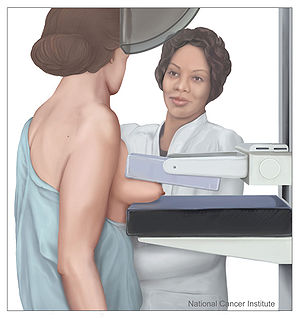 Image via Wikipedia
Image via WikipediaOctober 17, 2011
By Shari Roan, Los Angeles Times / For the Booster Shots blog
Having a mammogram each year after age 40 is controversial. Various medical associations and health experts disagree over whether all women need an annual mammogram during their midlife years. Now a study suggests that far fewer women would be put through the anxiety of being called back for a second mammogram and unnecessary biopsies if screening took place every two years.
The study, published Monday in the Annals of Internal Medicine, consisted of data from more than 169,000 women age 40 to 59. Researchers led by the Group Health Research Institute in Seattle found that in 10 years of annual screening, 61% of the women will be called back for another mammogram screening because the first reading was inconclusive. About one in 12 women will be referred for a "false positive" biopsy.
But when screening occurred every other year, about 42% of women were called back for another mammogram.
Researchers also found that having prior year mammograms available made a big difference in reducing false positive readings. That's why women should try to have their mammograms taken at the same place each time or, if they switch sites, order their previous mammograms sent to the new office.
Screening every other year also did not greatly affect breast cancer severity. Among women diagnosed with cancer, those screened at two-year intervals were only slightly more likely to be diagnosed with advanced disease compared with those screened yearly.
"Women and physicians should be aware of the possibility of these harms associated with different screening intervals so they can make informed decisions about screening and be prepared for what to expect when they receive their results," the authors wrote. The study is published in the Annals of Internal Medicine.
Also in the journal this month, researchers comparing digital versus traditional film mammography found little difference in breast cancer detection rates in women age 50 to 79. However, women age 40 to 49 with dense breasts may benefit from digital mammography, the authors said.
Copyright © 2011, Los Angeles Times
Taken from Los Angeles Times, Booster Shots; source article is below:
Annual mammography produces many false positives, study finds

No comments:
Post a Comment